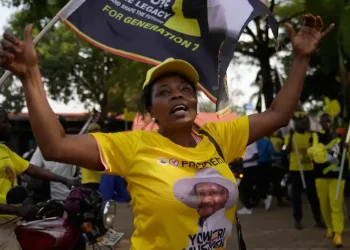A 68-year-old British woman convicted of drug smuggling in Indonesia will be repatriated to the UK, avoiding execution under a new bilateral agreement. Another Briton serving a life sentence will also return home under the deal. The move reflects ongoing cooperation between the UK and Indonesia on prisoner repatriation.
Background of the Case
Lindsay Sandiford, 68, has been detained on Bali since 2012 after authorities discovered 3.8 kilograms (8.4 pounds) of cocaine hidden in her suitcase, valued at approximately $2.5 million. Sandiford stated during her trial that she was coerced by a criminal gang that threatened her children.
Following her conviction, she was sentenced to death by firing squad, a sentence confirmed by Indonesia’s Supreme Court in 2013.
Another Repatriation Case
The repatriation agreement also covers Shahab Shahabadi, 35, who has been serving a life sentence in Jakarta since 2014. Shahabadi was arrested as part of an investigation into an international drug trafficking network. Prosecutors reported that he had previously sent 30 kilograms (15 pounds) of methamphetamine from Iran to Jakarta for distribution before being apprehended himself.
Government Statements
Secretary of State for Foreign and Commonwealth Affairs, Yvette Cooper, highlighted Sandiford’s age and health as factors in the repatriation. “Both of them are facing problems. The first one is ill and has been examined by a doctor from the British Consulate in Bali. She is seriously ill and is 68 years old,” Cooper said. She formally signed the repatriation agreement with Indonesia’s Senior Minister of Law, Yusril Ihza Mahendra.
Indonesia’s Prisoner Repatriation Policy
Under President Prabowo Subianto, Indonesia has repatriated several foreign prisoners through bilateral agreements. Notable cases include a Filipina facing the death penalty for drug offenses and five Australians convicted of heroin trafficking. These agreements allow inmates to serve sentences in their home countries rather than face execution abroad.
Indonesia’s Drug Law Context
Indonesia is known for its stringent drug laws and severe penalties, including capital punishment. The United Nations Office on Drugs and Crime identifies Indonesia as a major hub for drug smuggling, with international syndicates often targeting the country’s young population.
According to recent data from Indonesia’s Ministry of Immigration and Corrections, approximately 530 people are on death row, with nearly 100 being foreign nationals. The country’s last executions, involving both local and foreign convicts, took place in July 2016.
Implications and International Reactions
The repatriation agreement underscores ongoing diplomatic collaboration between Indonesia and the UK. It also highlights broader global challenges related to drug trafficking and the enforcement of capital punishment. Experts say such agreements are crucial for addressing humanitarian concerns while respecting domestic legal frameworks.
This article was rewritten by JournosNews.com based on verified reporting from trusted sources. The content has been independently reviewed, fact-checked, and edited for accuracy, neutrality, tone, and global readability in accordance with Google News and AdSense standards.
All opinions, quotes, or statements from contributors, experts, or sourced organizations do not necessarily reflect the views of JournosNews.com. JournosNews.com maintains full editorial independence from any external funders, sponsors, or organizations.
Stay informed with JournosNews.com — your trusted source for verified global reporting and in-depth analysis. Follow us on Google News, BlueSky, and X for real-time updates.













